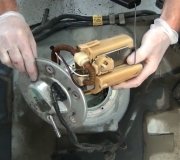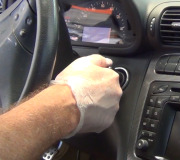Hi kneteru. Welcome to the forum. I wouldn't put much faith in your friend's ideas. If a fuse were blown, the fuel pump would not run for two minutes. You know the fuse has to be good if the pump runs at all, and the pump has to be running if the engine runs at all. Fuses don't fix themselves. Also, a fuel filter will not cause an engine to stall after it has been running. If it is partially plugged, you will have other running problems, but not stalling. I know this sounds backwards, but your filter actually passes the largest volume of fuel during coasting from highway speeds.
I'm not sure what you mean by "should he have asked me to replace everything before installing it", but I assume you mean the fuel pump or other parts needed to fix the stalling problem. How would he know there are other problems until he installed the engine? This is a rare case where the two of you can narrow down the cause of the problem by observing if this is a new problem since the engine was installed. If you had the same stalling problem with your old engine, suspect a defective component not on the engine. It is extremely rare for a running fuel pump to stop abruptly on its own. Usually they intermittently fail to start up when you try to start the engine. Of course there are exceptions to every rule, but if your fuel pump really is quitting while running, I would suspect a problem with the wiring before the pump itself. A corroded pin in an electrical connector, a connector that isn't completely plugged in, a stretched or deformed pin, or a similar problem would be more likely.
If this is a new problem that just started with the new engine, suspect a problem related to it. Your description of sudden stalling after warm-up is typical of a failing crankshaft position sensor, especially if the problem is fairly consistent. There is no easy way to test the sensor itself for a temperature-related problem. Most cars will memorize a diagnostic fault code in the Engine Computer indicating a problem with the sensor but it has to act up long enough to be detected. Sometimes when the engine stalls so quickly, the computer doesn't realize it was due to a lost signal from the sensor.
Also, some cars use a tap on the oil pressure sending unit to send power to the electric fuel pump. That is done to turn the pump off in the event of a crash that ruptures a fuel line. A defective sending unit or low oil LEVEL can cause stalling due to the fuel pump stopping. This will happen after driving for anywhere from a few miles to an hour or more and can be very difficult to diagnose. The secret is to connect a voltmeter or test light to the fuel pump connector and position it inside the car so you can see what happens when the engine stalls.
Check for spark too when the engine stalls, not just loss of fuel. If both spark and fuel are missing at the same time, the problem is not in either circuit. The problem is in something both circuits have in common, which would be that crankshaft position sensor or possibly a camshaft position sensor.
Caradiodoc
Friday, May 21st, 2010 AT 2:50 AM



